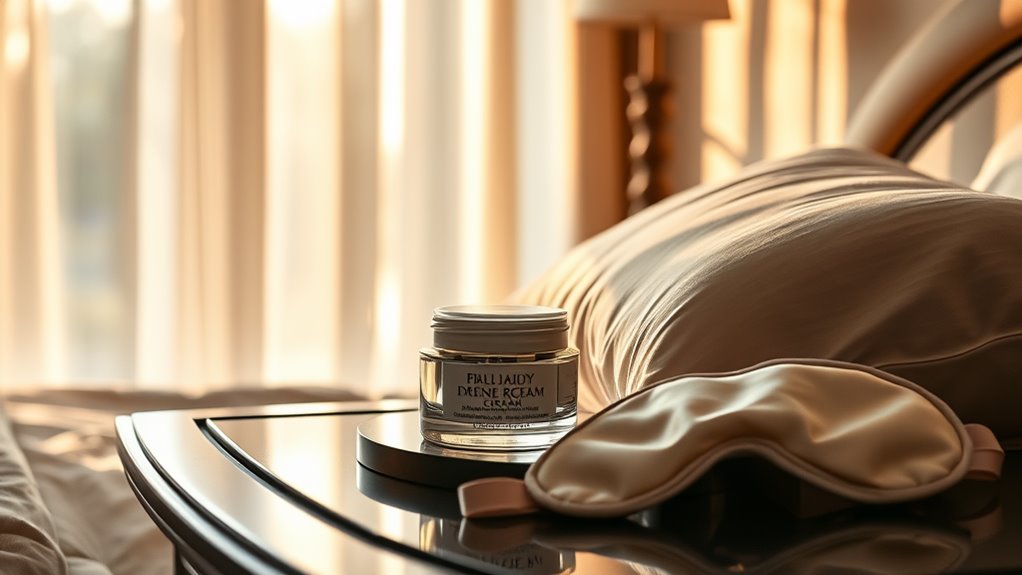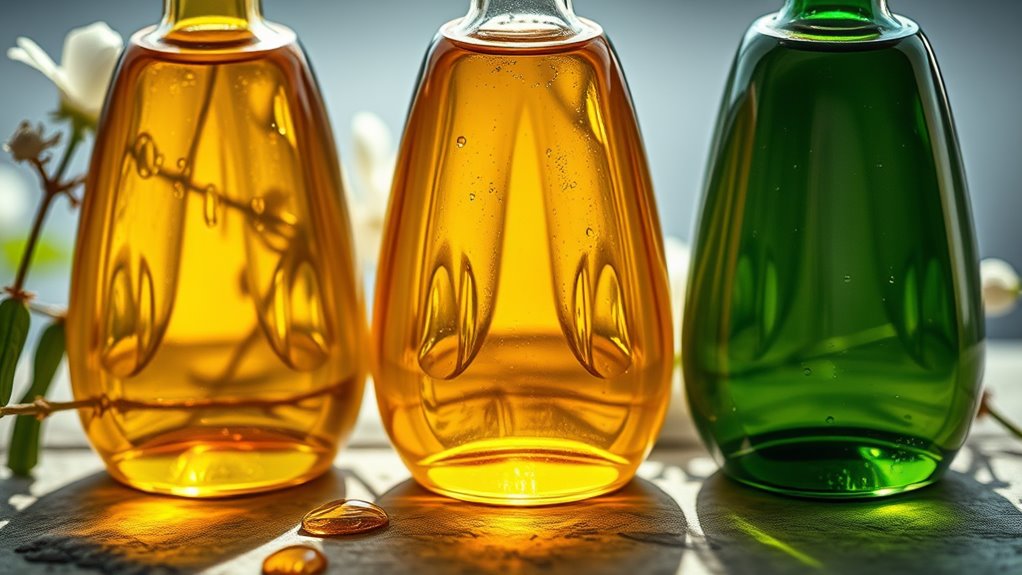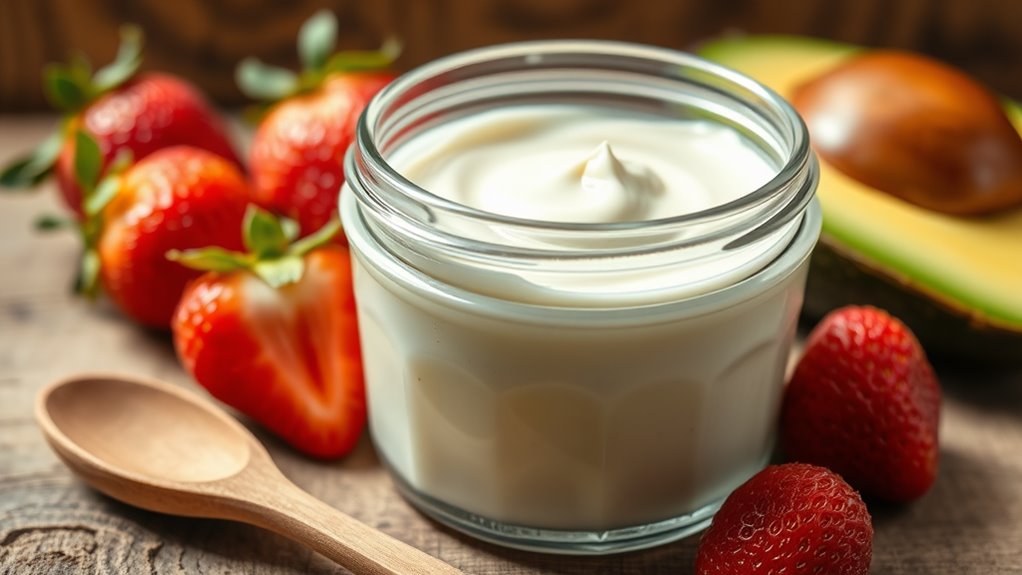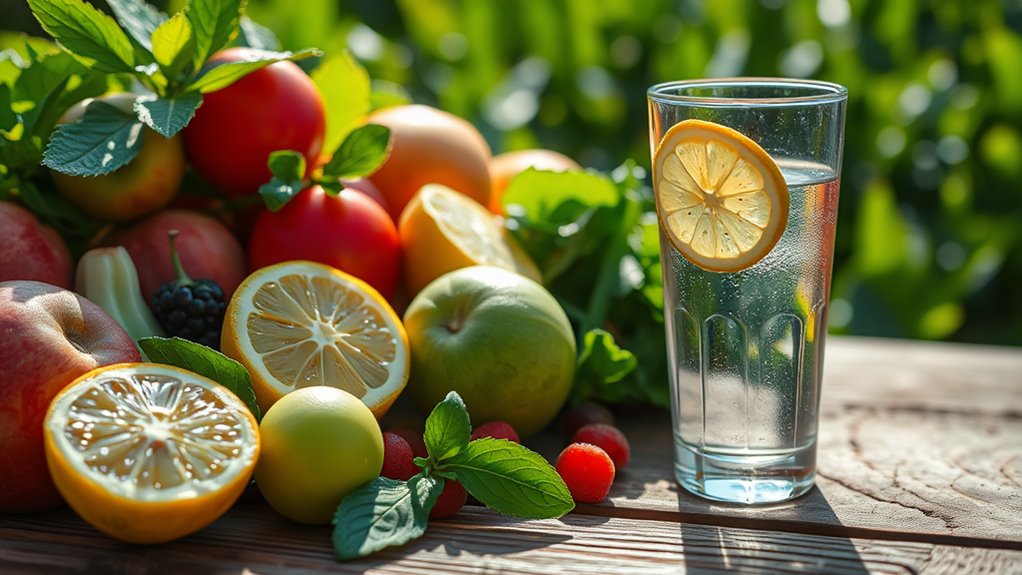Natural Sun Protection You Probably Never Tried
You might not realize that several uncommon foods can boost your skin’s natural defenses against the sun. Foods like salmon and tomatoes are rich in antioxidants, while dark chocolate and green tea can enhance resilience to UV damage. Herbal remedies like aloe vera and calendula oil help soothe and protect your skin. Don’t forget essential oils, such as carrot seed and raspberry seed oils, which offer natural SPF properties. There’s so much more to explore on this topic!
Key Takeaways
- Incorporate foods rich in antioxidants, like astaxanthin from salmon and lycopene from tomatoes, for natural sun protection.
- Use herbal remedies such as aloe vera and calendula oil for soothing sunburns and enhancing skin resilience.
- Try essential oils like carrot seed oil and raspberry seed oil, which offer natural SPF properties.
- Make your own sunscreen at home using coconut oil, shea butter, and zinc oxide for effective protection.
- Stay hydrated and maintain a nutrient-rich diet to support skin health and defense against UV damage.
Uncommon Foods for Natural Sun Protection
While most people know about common sun protection methods, you might be surprised to learn that certain uncommon foods can also help shield your skin from harmful UV rays.
Incorporating foods rich in antioxidants, like astaxanthin from salmon or lycopene from tomatoes, can act as a natural sun block. These powerful compounds help neutralize free radicals and reduce skin damage.
Additionally, consuming dark chocolate, which contains flavonoids, can enhance your skin’s resilience against sunburn.
Don’t overlook the benefits of green tea, either; its polyphenols provide impressive protective qualities.
Herbal Remedies That Shield Against UV Rays
Herbal remedies can offer an effective line of defense against UV rays, enhancing your skin’s natural protection.
Consider incorporating green tea into your routine; its polyphenols can reduce skin damage from sun exposure. Aloe vera is another powerhouse, soothing sunburns and promoting healing due to its anti-inflammatory properties.
You might also explore the benefits of calendula oil, known for its ability to enhance skin resilience against UV-related damage. Additionally, neem oil provides antibacterial properties while shielding your skin from harmful rays.
Finally, look into using rosemary extract; its antioxidants may help combat oxidative stress caused by UV exposure. Furthermore, integrating food-based solutions into your diet can further bolster your skin’s defense against sun damage.
Lifestyle Changes to Enhance Your Skin’s Defense
Making simple lifestyle changes can greatly enhance your skin’s defense against UV damage.
Start by prioritizing a nutrient-rich diet packed with antioxidants. Foods like berries, leafy greens, and nuts bolster your skin’s resilience. Additionally, incorporating foods that boost collagen production can further support skin health and elasticity.
Stay hydrated, as proper hydration helps maintain skin elasticity and repair. Incorporate a consistent exercise routine to improve circulation, delivering essential nutrients to your skin. Aim for at least 30 minutes of activity most days.
Also, don’t underestimate the power of adequate sleep—your skin regenerates during this restorative phase.
Finally, managing stress through mindfulness or yoga can reduce inflammation, which often compromises skin health.
Essential Oils With Natural SPF Properties
If you’re looking for natural ways to enhance your sun protection, essential oils with natural SPF properties can be a great addition to your skincare routine. These oils not only provide a pleasant aroma but also offer a degree of sun protection. Here are some essential oils worth considering:
| Essential Oil | SPF Rating |
|---|---|
| Carrot Seed Oil | 38-40 |
| Raspberry Seed Oil | 28-50 |
| Wheat Germ Oil | 20 |
| Coconut Oil | 4-5 |
| Lavender Oil | 6 |
Incorporating these oils into your daily regimen can help bolster your skin’s defenses against harmful UV rays. Just remember, while they can enhance protection, they’re not a substitute for sunscreen.
DIY Sun Protection Recipes You Can Try at Home
Creating your own sun protection at home can be both fun and rewarding, especially when you know exactly what ingredients are going on your skin.
Start with a simple DIY sunscreen using 1/4 cup of coconut oil, 1/4 cup of shea butter, and 2 tablespoons of zinc oxide. Melt the oils together, mix in the zinc oxide, and pour it into a container.
You can also enhance this recipe with a few drops of essential oils like lavender or carrot seed for added benefits.
For a lighter option, combine 1/4 cup of aloe vera gel with 2 tablespoons of jojoba oil and a few drops of your favorite essential oil.
Whip it up for a rejuvenating, moisturizing sunblock. Enjoy mastering your natural sun protection!
Frequently Asked Questions
How Often Should I Reapply Natural Sun Protection Products?
You should reapply natural sun protection products every two hours, especially if you’re sweating or swimming. Consistent application guarantees ideal protection, so make it a habit to check and refresh your coverage throughout the day.
Can I Use Natural Sun Protection on Sensitive Skin?
Yes, you can use natural sun protection on sensitive skin. Just guarantee the ingredients are gentle and hypoallergenic. Test a small area first, and if irritation occurs, discontinue use and consult a dermatologist.
Are There Any Side Effects of Herbal Sun Protection?
Herbal sun protection can cause side effects like skin irritation or allergic reactions, especially if you’re sensitive to certain plants. Always patch test new products and consult a dermatologist if you’re unsure about specific ingredients.
What Is the SPF Equivalent of Common Natural Ingredients?
You’ll find that common natural ingredients like coconut oil offer an SPF of about 4-5, while shea butter can provide around 6. However, their effectiveness varies, so it’s essential to layer with additional protection.
How Do Environmental Factors Affect Natural Sun Protection Efficacy?
Environmental factors like UV intensity, humidity, and temperature greatly influence natural sun protection efficacy. You’ll find that higher temperatures can degrade protective compounds, while humidity may affect their application and absorption on your skin.





